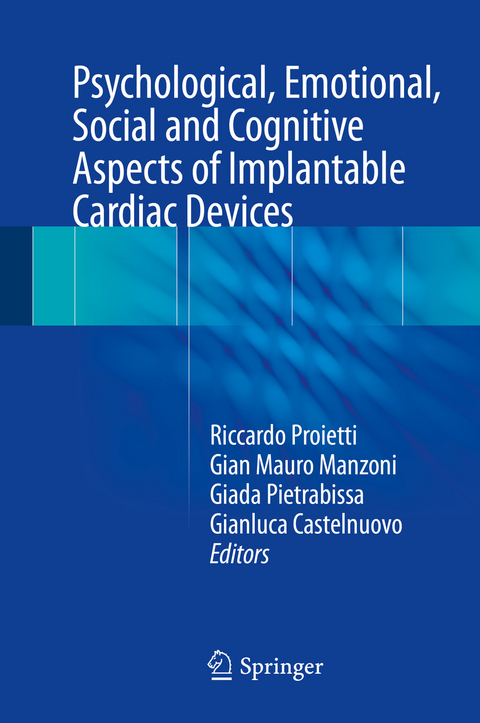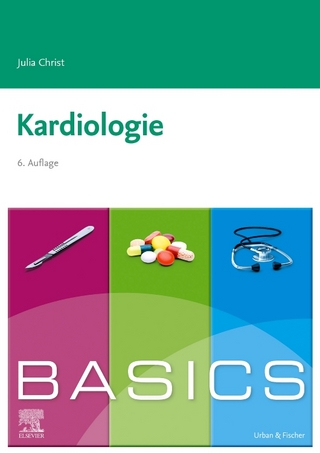
Psychological, Emotional, Social and Cognitive Aspects of Implantable Cardiac Devices
Springer International Publishing (Verlag)
978-3-319-55719-9 (ISBN)
Since 2010 Dr. Riccardo Proietti MD has operated as Consultant Cardiologist at Luigi Sacco Hospital of Milan, specialising in cardiac pacing and electrophysiology. He has been certified in transthoracic echocardiography by the Società Italiana di Ecografia Cardiovascolare (SIEC). He is a member of the European Heart Rhythm Association (EHRA), the National Cardiology Association (ANMCO) and the Italian Society of Echocardiography (SIEC). Between 2005 and 2012 Dr. Gian Mauro Manzoni was a clinical psychologist and researcher at the Ospedale San Giuseppe, Istituto Auxologico Italiano, specialising in cardiac rehabilitation. From January 2013 to March 2014 he held a position as a post-doc researcher at the Catholic University of Milan, Department of Psychology. Since May 2014 he has been the author of several articles in national and international peer-reviewed journals, as well as acting as the associate editor of the peer-review journal Frontiers in Psychology for Clinical Settings. Prof. Gianluca Castelnuovo has served as the Assistant Professor of Clinical Psychology and Rehabilitation Psychology at the Catholic University of Milan since 2008. He is the author of several articles in national and international peer-reviewed journals, as well as acting as the specialty Chief Editor of Frontiers in Psychology for Clinical Settings and the Associate Editor in clinical and health psychology journals (BMC Obesity, Eating and Weight Disorders, Health Psychology and Behavioural Medicine). Prof. Giada Pietrabissa trained at the Catholic University of Milan, Italy. She has written a number of articles in national and international peer-reviewed journals, and is a member of Order of Psychologists of Lombardy. She also operates as a psychological support consultant.
Cognitive function in patients with congestive heart failure.- Heart brain connection in patients with ischemic heart disease.- Neurovegetative system and congestive heart failure.- Cognitive performance in the elderly.- Evolution and principle of pacing devices.- Hemodynamic performance of cardiac devices.- Impact of cardiac devices on QoL.- Pacemakers and cognitive performance.- Anxiety, depression and QoL in patients with ICD.- Emotional impact of device recall.- Cognitive impact of CRT.
"This book is a useful reference on the pathophysiology, screening, and treatment of problems associated with implantable cardiac devices. ... very valuable for cardiology trainees and educators who train medical students/residents, in addition to practicing cardiologists. ... a guide to problems associated with implantable cardiac devices that provides a detailed description of psychological side effects and the best way to approach them. It also provides insights about ICDs in children and youth and the best ways to approach their families." (Mohanad Hasan, Doody's Book Reviews, October, 2017)
| Erscheinungsdatum | 05.07.2017 |
|---|---|
| Zusatzinfo | XI, 296 p. 11 illus., 5 illus. in color. With online files/update. |
| Verlagsort | Cham |
| Sprache | englisch |
| Maße | 155 x 235 mm |
| Gewicht | 652 g |
| Themenwelt | Medizinische Fachgebiete ► Innere Medizin ► Kardiologie / Angiologie |
| Medizin / Pharmazie ► Medizinische Fachgebiete ► Psychiatrie / Psychotherapie | |
| Schlagworte | Cardiac Resynchronization Therapy • Cardiology • Cardiovascular medicine • Cognitive Functions • Implantable cardiac devices • Implantate • Kardiologie • Medicine • Medicine: general issues • Mental Health • pacemaker • Psychiatry • quality of life |
| ISBN-10 | 3-319-55719-X / 331955719X |
| ISBN-13 | 978-3-319-55719-9 / 9783319557199 |
| Zustand | Neuware |
| Haben Sie eine Frage zum Produkt? |
aus dem Bereich


